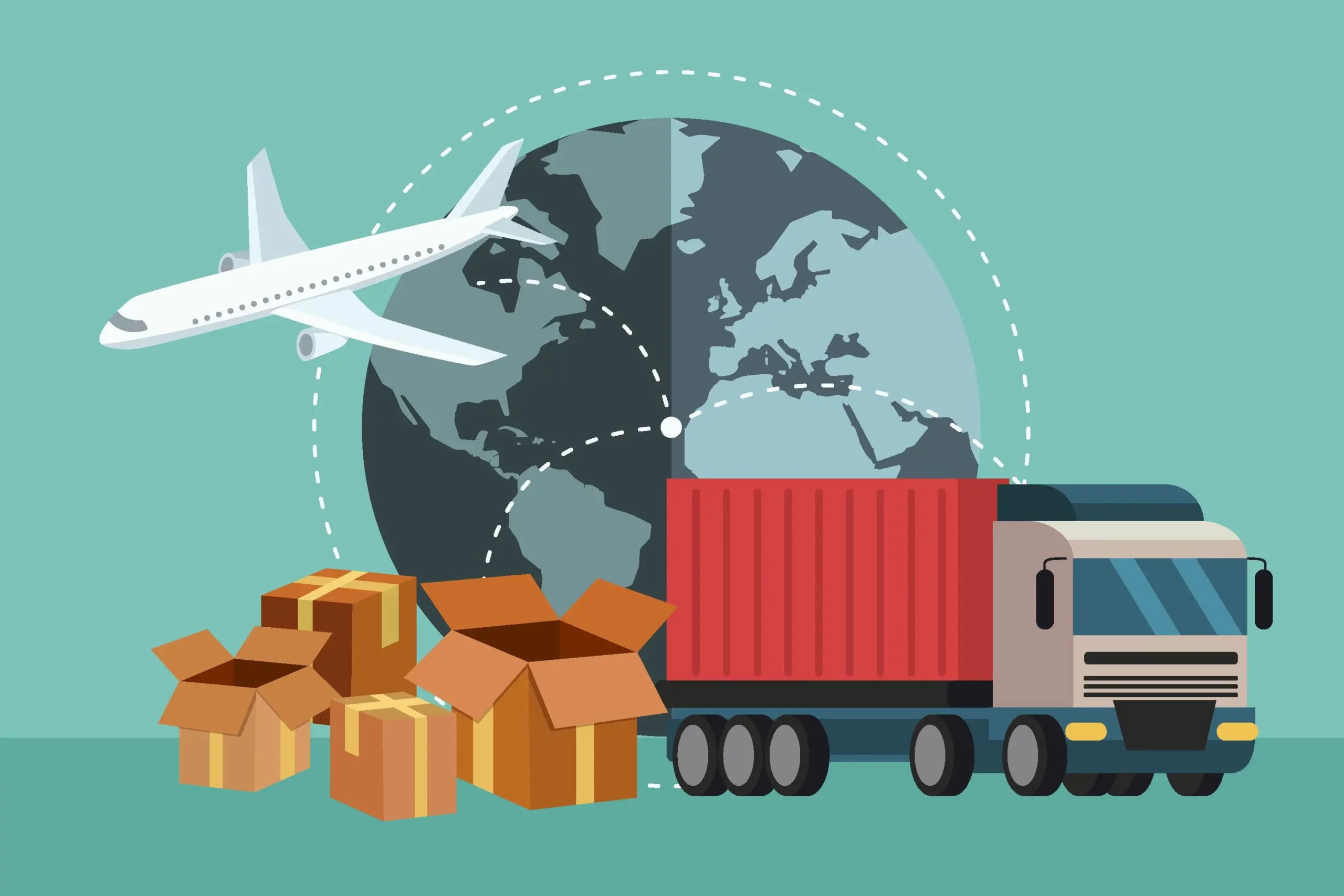Ultimate Guide to Freight Brokerage: Enhancing Your Logistics Strategy
The flow of goods between continents and cities is essential to the freight industry with a market size of $17.58 billion as of 2024-25. However, to make sure your goods reach their destination efficiently and cost-effectively, you need a skilled intermediary, a freight broker.
Freight brokers act as the bridge between shippers, who have goods to transport, and carriers, the trucking companies with the capacity to move them. They simplify the shipping process for all parties involved, playing a crucial role in the logistics and transportation sector.
This blog dives deep into the world of freight brokerage. We’ll examine its core functionalities, understand the key differences between brokers and other logistics suppliers, and examine the challenges and fascinating new developments influencing this rapidly evolving industry. By the end, you’ll be equipped with the knowledge to leverage freight brokerage as a strategic tool to enhance your overall logistics strategy.
The Core Functions of a Freight Broker
Freight brokers wear many hats, acting as a liaisons between shippers and carriers to ensure a smooth and efficient shipping process. Let’s examine the daily tasks and activities that maintain this essential logistics function in motion:
Shipper Communication and Needs Assessment: First, freight brokers must determine the shipper’s individual needs. This contains information about the kind of products being shipped (hazardous items, perishables, etc.), weight, dimensions, the places of origin and destination, and the expected times of delivery.
Selecting a Carrier and Negotiating a Rate: Freight brokers use their network of pre-screened carriers to choose the most appropriate one for the particular shipment. During the selection process, variables including cost-effectiveness, regional coverage, and an appropriate kind of truck are all taken into account. On behalf of the shipper, they also bargain with carriers for reasonable pricing. To acquire the most affordable alternative, they must leverage their established ties with carriers and market knowledge.
Booking and Documentation: The freight broker books the shipment on behalf of the carrier after a carrier is chosen and a rate is decided upon. This guarantees that the truck or container has the appropriate amount of space. Freight brokers also handle the preparation of crucial shipping documents, including bills of lading, commercial invoices, and any other necessary forms to comply with regulations.
Communication and Shipment Tracking: Freight brokers keep shippers updated on the status of their goods by giving them access to real-time shipment tracking information. They serve as the primary point of contact for any queries or issues that might come up during the shipping procedure between the shipper and the carrier.
Problem-Solving and Resolution: Unexpected delays might happen even with meticulous planning. In the event of setbacks, goods brokers diligently seek out alternatives to keep the shipment going. A fair resolution to any disputes that may arise between the shipper and carrier (damages, discrepancies, etc.) can be facilitated by the goods broker serving as a mediator.
The Value Freight Brokers Bring to Logistics
Optimizing your logistics strategy is essential for business success in the highly competitive market of today. The benefits of using freight brokers are numerous, including operational simplification and increased supply chain efficiency. Let’s examine the main advantages of using their services:
Cost savings: By utilizing their contacts with carriers and industry expertise, freight brokers are able to bargain for affordable prices. In addition, they can assist shippers in making the most economical choices for their shipping needs by taking into account variables such as shipment size, distance, and urgency. Furthermore, freight brokers can assist shippers in avoiding expensive mistakes or delays brought on by navigating complicated shipping regulations by managing every part of the transaction.
Enhanced Efficiency: For all of your shipping needs, freight brokers serve as a one-stop shop. They take care of the laborious duties including locating carriers, haggling over prices, scheduling shipments, and organizing documentation. This allows shippers to concentrate on their main business operations by freeing up important resources.
Access to a Broad Network: It takes time and work to establish connections with carriers. Due to the networks of pre-screened carriers that freight brokers have built, shippers have access to more transportation options than they could obtain on their own. More flexibility is offered by this enlarged network, which guarantees that a carrier will be located regardless of the shipment’s particular requirements.
How Freight Brokerages Generate Revenue
The business strategy of freight brokerages is based on finding shippers the best carriers at the highest possible rates. The main revenue models are broken down as follows:
Commissions: The most typical source of income for freight brokerages is commissions. A portion of the shipper’s overall freight payment is used as this commission. The precise proportion may change based on the broker’s agreement with the carrier, the negotiation’s leverage, and the shipment’s complexity.
Markup on Carrier Rates: Before giving the carrier’s quoted rate to the shipper, freight brokers occasionally apply a markup to it. This markup is a representation of the value that the broker adds by managing the logistics, locating the ideal carrier, and negotiating a favourable rate.
Value-Added Services: A few freight brokerages go above and beyond simple transportation planning. These could involve insurance brokerage, goods tracking software, warehousing, or help with customs clearance. These value-added services are paid for separately by clients, creating new revenue streams.
Role of Volume and Relationships:
The freight brokerage industry’s profitability is contingent upon two primary factors: volume and relationships.
Volume: A broker’s total commission or markup revenues increase with the number of shipments they help arrange. Carriers find freight brokers with large volumes of business more appealing, which could result in even better-negotiated prices and more profitability.
Relationships: It’s essential to have solid ties with shippers and carriers. Recurring business and a consistent flow of shipments are the results of trustworthy relationships with shippers. Good carrier partnerships enable brokers to negotiate the best prices and guarantee dependable transportation choices for their customers.
The Distinction Between Freight Brokers and Freight Forwarders
The terms ‘freight broker’ and ‘freight forwarder’ are often used interchangeably, but there are distinct differences between these two logistics players. Selecting the best partner for your unique shipping requirements might be made easier if you are aware of these differences.
| Feature | Freight Broker | Freight Forwarder |
| Role | Intermediary between shippers and carriers | Extension of shipper’s logistics department |
| Responsibilities | – Assess shipper needs- Find suitable carriers- Negotiate rates- Book shipments & manage documents- Track shipments & communicate | All of Freight Broker’s responsibilities, Plus:- Physical cargo handling (packing, palletizing)- Warehousing & storage solutions- Customs clearance & trade documentation- Cargo insurance options |
| Value Added | – Cost savings through rate negotiation- Increased efficiency- Access to wider carrier network | All of Freight Broker’s benefits, Plus:- Complete logistics management- Expertise in international regulations- Warehousing & inventory solutions |
| Ideal for | Domestic shipments or simpler international needs | Complex international shipments or those requiring physical handling/storage |
Overcoming Challenges in Freight Brokerage
The freight brokerage industry is a vibrant, fast-paced field. Brokers have several obstacles to overcome in order to maintain efficient operations and satisfied clients, even though it provides a fulfilling professional path. Below is a summary of some typical obstacles and practical solutions:
Maintaining Robust Carrier relationships: Securing the best pricing and most dependable capacity requires developing long-term partnerships with carriers based on trust. However, because of factors like shifting fuel prices and unstable economic situations that can put pressure on carrier profit margins, this might be difficult. By continuously providing carriers with flexible payment periods, steady business volume, and open communication throughout the shipment process, goods brokers can get around this. Through exhibiting their worth as a dependable collaborator, brokers can cultivate more robust connections and secure preferential treatment from carriers.
Ensuring Timely Deliveries: In the logistics sector, client satisfaction with on-time deliveries is critical. However, unanticipated delays brought on by things like bad weather, heavy traffic, or vehicle maintenance problems can ruin carefully laid out schedules. Through direct communication with shippers and carriers, freight brokers can reduce these risks. This makes it possible to monitor shipments proactively and spot possible issues before they become serious.
Furthermore, having backup measures in place, such as access to alternate routes or carriers, can help minimize the impact of unforeseen delays. Enhancing customer satisfaction demands providing shipment tracking capabilities is another essential aspect, especially as data-driven millennials increasingly prioritize transparency in their deliveries. This underscores the vital significance of transparency and punctuality in our services.
Adapting to Market Fluctuations: The transportation and logistics sector is subject to outside influences such as changing petroleum prices, changes in the economy, and even world events. These elements have a big influence on shipping costs and carrier availability, which makes it hard for brokers to secure the best deals for their clients. By using data analysis tools and industry magazines to stay up to date on market trends, goods brokers can effectively tackle this difficulty. Brokers can stay competitive and provide value to their clients by adjusting their pricing strategies and carrier selection processes in front of market fluctuations.
Handling a Sea of Data: Freight brokers handle a plethora of data, such as shipment specifics, carrier agreements, pricing information, and legal paperwork. Accurate decision-making and smooth operations depend on efficient data management. It can be intimidating, though, due to the sheer amount and intricacy of this data. Purchasing effective logistics management software may eliminate tedious chores like document production and shipment tracking and streamline data organization. Furthermore, establishing unambiguous communication guidelines for the brokerage and its clients guarantees data accuracy by establishing consistent methods for recording and sharing information.
Story of Shypple: A Freight Forwarding Platform for Perishable Goods.
Shypple is revolutionizing the perishables industry with the world’s first digital freight forwarding platform designed specifically for these time-sensitive goods. Traditional methods like spreadsheets and emails are replaced with Shypple’s fast, reliable, and streamlined solution.
This technology provides near real-time terminal data, including the most recent schedules, to address the issues posed by the crowded container market. Now that they know exactly when their shipment will be unloaded, shippers can meticulously organize the remainder of the supply chain and guarantee freshness.
Shypple provides a centralized platform with real-time data, providing a comprehensive overview of transport activities to all teams inside an organization. This openness makes it possible to react to changes quickly and effectively, which completely transforms the way perishables logistics operate.
A similar platform is offered by GoComet which addresses multiple supply chain and logistics concerns with tools like real-time container tracking, freight procurement and invoice automation. GoComet serves as a larger supply chain and logistics command center, in contrast to Shypple’s heavy focus on perishables. With features like automatic invoice processing, comprehensive freight procurement tools, and real-time container tracking, their platform provides a one-stop shop for handling the whole logistics process. By doing this, businesses can guarantee the freshness of perishables while simultaneously cutting expenses and streamlining processes throughout their whole supply chain.
The Future of Freight Brokerage
The freight brokerage sector is about to undergo a dramatic change. The following significant trends will shape this dynamic field’s future:
Enhanced Compliance with Regulations: The rules governing the transportation of goods are always changing. In order to guarantee that their activities continue to be compliant, brokers will need to keep up with these changes. Here, technology can be quite helpful. Software programmes can assist brokers in keeping accurate documentation and managing complicated laws.
The Growing Significance of Sustainability: Organisations throughout the supply chain are placing an increasing amount of emphasis on environmental issues. The demand for environmentally friendly shipping solutions is rising. Committed to sustainability, forward-thinking freight brokers will give top priority to collaborating with carriers who provide carbon-neutral shipping options to their clients. This emphasis on sustainability may serve as a crucial point of differentiation to draw in environmentally conscious clients.
Leveraging Technology in Freight Brokerage
The freight brokerage industry is quickly harnessing the potential of modern technology. Broker operations are being revolutionized by creative solutions that prioritize automation, efficiency, and insightful information. This is how freight brokerage is being revolutionized by technology:
Digital Marketplaces: Shippers and carriers are connected in a smooth online environment through the creation of digital marketplaces and procurement tools by platforms such as GoComet. This streamlines the process of locating the ideal match for every shipment by doing away with the need for manual searches and phone calls. Real-time data and open pricing lead to a more productive and economical experience for both shippers and carriers.
AI-Driven Logistics Solutions: By automating tedious operations and offering insightful data analysis, artificial intelligence (AI) is transforming the freight brokerage industry. Large volumes of data can be analyzed by AI systems to optimize carrier selection, bargain for the best prices, and anticipate possible disruptions. Brokers can now devote more of their time to fostering solid bonds with customers and carriers, providing strategic advice, and handling challenging logistics problems.
Real-Time Tracking and Visibility: The days of incessant check-in calls are long gone. Real-time shipment monitoring made possible by modern technology lets brokers and their clients keep tabs on the status of items as they travel. This enhanced visibility fosters trust and transparency within the logistics chain, ensuring everyone is on the same page.
The GoComet Advantage: Platforms like GoComet provide a full range of technological solutions that are specifically made to enable smooth operations. Through the use of GoComet’s cutting-edge technology, you can:
- Get access to an extensive network of carefully selected providers for unrivaled capacity and affordable prices.
- Make use of AI-powered solutions for route optimisation, dynamic pricing, and wise carrier selection.
- Get up-to-date shipping visibility for more proactive and transparent communication.
- Oversee every facet of the brokerage process with a centralized, user-friendly interface.
Conclusion
The smooth flow of commodities is essential to the business sector. For companies of all sizes, however, mastering the complexity of the logistics sector can be a difficult undertaking. This is where freight brokers come in, acting as skilled middlemen that connect shippers and carriers. Freight brokers make sure your goods arrive at their destination efficiently and cost-effectively by utilizing their experience, industry knowledge, and existing networks.
We’ve covered the fundamental functions of freight brokerage, their contributions to logistics, and the developments influencing this fast-paced sector in this blog. Freight brokers have demonstrated the ability to accelerate the shipping process, manage crucial responsibilities such as carrier selection and tariff negotiation, and guarantee on-time delivery by means of transparent communication and proactive problem-solving.
To sum up, goods brokers are strategic partners who can greatly improve your entire logistics strategy—they are more than just intermediaries. You can get a greater selection of carriers, affordable prices, and real-time package tracking by using their services. Additionally, freight brokers handle the always shifting legal landscape and new technological advancements, allowing you to focus on your core business activities with peace of mind.






